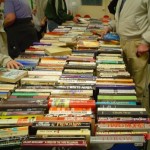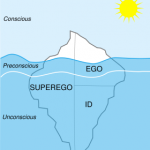It’s been quite a month, and while I’ve been able to spend a lot of time with my daughters, it’s also been exhausting. I’ve had to choose sanity and take a few expectations off of my plate: mostly self-imposed expectations, often the heaviest ones. Not all laundry must be clean and put away at all times; not every snack my girls eat at home must be homemade and organic and local (you can take the girl out of the Bay Area, but…); dinner does not need to be simmering on the stove when anyone walks in the door. Or, maybe one might be feasible, but not all three in the same day.
And yes: not every blog post must be perfect, beautiful, articulate, collected. For now, the point is to keep writing, whether it’s for the joy of it (Stephen King’s On Writing) or if it’s only for 15 minutes a day (Summer Pierre’s The Artist in the Office). It’s the writing as habit that’s been an important transition for me this summer. And because of writing, I think I newly understand the phrase “collecting your thoughts.”
So there are a few thoughts I’ve collected, picked up, from the cluttered floors in my mind:
1. I’m not entering a writing contest just to win, really. Although winning would be fabulous, it’s more about the commitment to set a larger goal and put my writing out there. A lot of my thirtysomething peers seem to be running 5Ks or triathlons (or marathons) to commit themselves in similar ways. The contest deadline‘s this week, so I’m going to be working on that application. I’ve got a cover letter mostly finished, and am going to be revising these pieces. And after that, I’m going to try to submit things elsewhere, maybe here and here. But I just want to keep my head down: write, revise, occasionally send (or hit “publish”).
2. Ever since I wrote about libraries a few weeks ago, I’ve been thinking about ways to help public libraries, beyond donating my books and beyond using the facilities. I was shocked to see that Seattle’s Central Library will be closed for a week next month, due to budget cuts. That library seems to serve so many, in so many ways. I’ve been heartened by NPR’s prediction that libraries will be the next cupcakes. I’ve seen several articles about libraries that have continued this thread in my mind. But I want to know what else I can do, or where to begin. I’ve been committed to American ethnic studies for almost a decade now, and I wonder if there’s a place for me to combine my commitments to that field with my renewed commitment to public libraries. Both of these institutions are firmly committed to radical inclusion and social diversity and educational justice; it shouldn’t surprise me, but it does, that both of these things are also currently under attack.
3. I’m going to look a bit more into metaphors for history. Ever since I read my first piece of historiography in grad school, I’ve wanted to know more about it. I’m fascinated with Walter Benjamin’s “angel of history,” with Suzan-Lori Parks’s “great hole of history.” I’ve been thinking more about it ever since I came up with my own metaphor for history and title for the book. Any cheap ventolin inhalers sale suggestions are more than welcome.
As a subset of that, I’m also curious about what makes something or someone historical. I’ll have to ask my historian friends and colleagues about that. What strikes me about internment and Japanese Americans is that in some ways, internment is a big part of what makes Japanese Americans “historic”—and there’s so little about what happened to them after they left camp. Are they no longer “historic” once the historical event has passed, in other words? What’s left once the boat and the wake have disappeared?
I’ve been mulling over the main character’s struggles in Louise Erdrich’s novel Shadow Tag:
How many times have I told you how difficult it is to resist the lure of the historical moment? The one action, the instantaneous truth that changes everything? How many times have I described my own struggles in telling stories, relating historical occurrences, searching for the sequence of events that results in a pattern we can recognize as history? There are always many moments, there is never just one. There are many points of clarity and many causes to one effect. However, after many, many of these points, these moments, have occurred, there is, I should tell you, a final moment. A final scene.” (48)
But I wonder about the desire to resist the lure of the historical moment. We find that the character’s narration is somewhat unreliable. I wonder if her desire to resist transcendence and knowledge (that is, the epiphany) is in itself revealing, and if so, how.
4. An MFA usually requires a large project. I’ve got my project. It’s already larger than I’d anticipated; at first, I thought it would be a reworking of a response to my dad’s manuscript about our family’s internment. And it is, but among other things, it’s also about:
- technology and memory: how do different forms of documenting (from typewritten manuscripts to Facebook photos) inflect how and what we remember?
- family and endurance: how has my family maintained its ability to laugh?
- creativity and multimedia: the textual, the visual, meshed with the archival; the creative lives of me, my dad, and my sister
After I enter the contest, I’ll need to figure out how to plot my next steps. In the meantime, I’ve been happy to spend so much time with printed pages and much less time with online pages (not that I don’t appreciate you reading this!). More printed pages have meant that I’ve been reading books, not just replenishing the well but also stirring up the pot, and seasoning the stew, to mix a few metaphors.
Four things: that’s the collection which is in the laundry basket for now: a few wrinkled items, a few fluffy items, a few that need to be hung up and put away. I’ll add some links to this post tomorrow evening or Wednesday, and I’ll post more about my entry in the contest towards the end of the week.
(For those of who you who asked for a post about farmers markets, I did write one, but it became something else entirely: a meditation about home and a marching song. I’ll keep trying. And I’ll post that one, too, once I revise it.)






